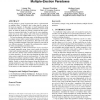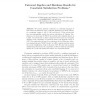134 search results - page 22 / 27 » On the Complexity of Computing Values of Restricted Games |
SIGECOM
2011
ACM
12 years 10 months ago
2011
ACM
In many settings, a group of agents must come to a joint decision on multiple issues. In practice, this is often done by voting on the issues in sequence. In this paper, we model ...
COCO
1994
Springer
13 years 11 months ago
1994
Springer
A probabilistically checkable debate system (PCDS) for a language L consists of a probabilisticpolynomial-time veri er V and a debate between Player 1, who claims that the input x ...
SIGECOM
2005
ACM
14 years 1 months ago
2005
ACM
This paper concerns the design of mechanisms for online scheduling in which agents bid for access to a re-usable resource such as processor time or wireless network access. Each a...
AI
2008
Springer
13 years 7 months ago
2008
Springer
In the arena of automated negotiations we focus on the principal negotiation protocol in bilateral settings, i.e. the alternatingoffers protocol. In the scientific community it is...
ICALP
2007
Springer
14 years 1 months ago
2007
Springer
We present algebraic conditions on constraint languages Γ that ensure the hardness of the constraint satisfaction problem CSP(Γ) for complexity classes L, NL, P, NP and ModpL. Th...


